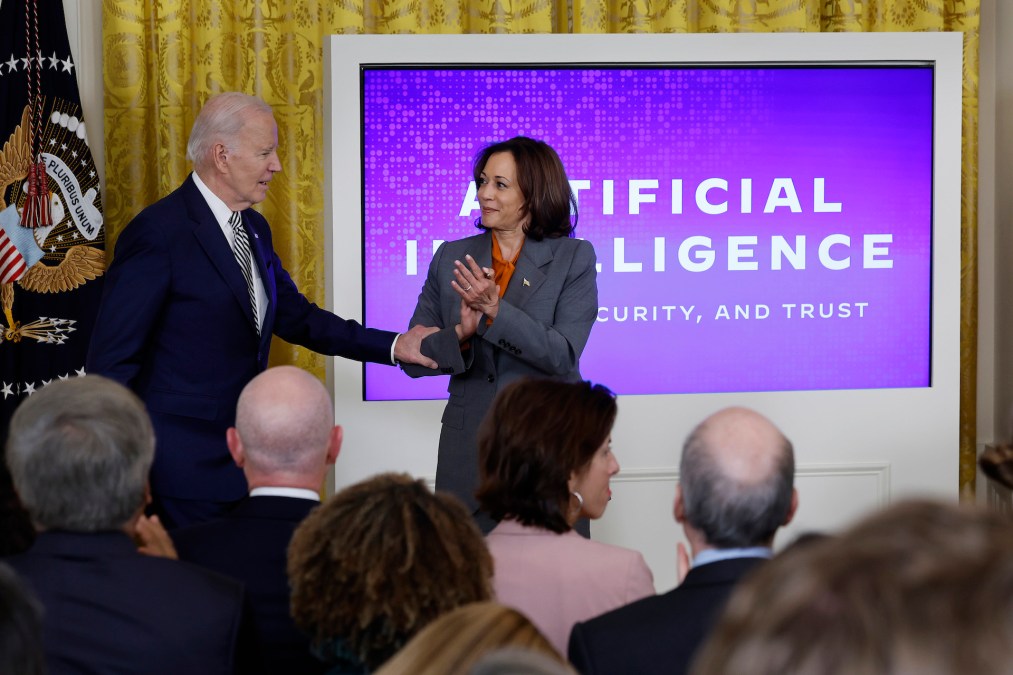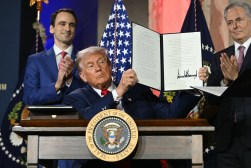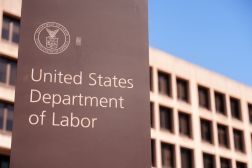Harris likely to combine Biden AI policies with Silicon Valley-informed approach

Over the past three or so years, Vice President Kamala Harris has acted as the public face of several of the White House’s actions on artificial intelligence. Now, as the presumptive presidential nominee for the Democratic party, Harris would likely continue the AI approach of the Biden administration, while also bringing her past experience with Silicon Valley to the table.
As the vice president, Harris has publicly taken the lead on some of the administration’s work on the emerging technology, including meeting with leaders of AI technology companies and securing voluntary safety commitments; introducing the Office of Management and Budget’s memo on AI use in the federal government; and representing the administration at the U.K.’s Global Summit on AI Safety.
Alondra Nelson, the former acting director of the White House Office of Science and Technology Policy who led the creation of the administration’s Blueprint for an AI Bill of Rights, told FedScoop in a statement that voters can “anticipate continuity” between Harris’s approach to science and technology policy and some of the work of the Biden administration.
That includes the AI governance strategy outlined in the White House’s executive order on the technology and outlined in a speech Harris gave last year in London, Nelson said.
“Harris will be the first President to have had prior experience navigating the Silicon Valley tech industry as she did as California’s attorney general, particularly,” Nelson said. “What I can say very knowledgeably is that Vice President Harris has taken a very sophisticated approach to these technologies, placing human interests at the center of policymaking.”
While AI regulation is a topic both parties have some agreement on, former President Donald Trump and the Republican Party would likely pursue a fairly different approach than a Harris administration.
The platform approved at the Republican National Convention would repeal the Biden administration’s executive order on the technology, saying it “hinders AI innovation.” That document isn’t specific about what it would be replaced with, but the Washington Post reported that Trump allies are working on plans to both develop AI military technology and deregulate. America First Policy Institute, which according to the Post is involved in the drafting, didn’t respond to multiple requests for comment.
The Democratic National Committee draft platform released earlier this summer, on the other hand, makes several references to artificial intelligence, pointing specifically to the Biden administration’s wide-ranging executive order on artificial intelligence, the AI Talent Surge, and the Commerce Department’s AI Safety Institute.
While Harris’s presidential bid is still in its early days — and artificial intelligence and technology policy is unlikely to be a major campaign issue — her past actions and statements on AI and technology as part of the current administration and in her California political career provide insight into how she might proceed.
Public-private tactic
Notably, Harris and her team at the White House led on a key action for the administration: getting voluntary agreements from AI companies — including Amazon, OpenAI, Microsoft, Google and Meta — on security testing and information-sharing measures.
Two sources with direct knowledge of White House operations, who spoke on background to be more candid, told FedScoop that Harris and the Office of the Vice President had been a leader in getting those commitments. One of those sources told FedScoop that Harris, with her understanding of Silicon Valley, knew that the administration couldn’t wait in taking a first step.
“So she mobilized the White House to get these companies to make safety commitments early, and she followed up regularly throughout that process, even while helping build a more comprehensive approach to AI,” the source said, adding that it was reflective of her policymaking approach of being “thorough and pragmatic.”
Jeff Zients, White House chief of staff, also told the New York Times the commitments were Harris’s idea.
These measures were criticized for their voluntary nature, and at least one federal official said they were a first step. But they also represented one of the first examples of White House leadership on the issue of artificial intelligence.
In her London speech, Harris acknowledged the commitments were just the beginning, calling them “an initial step toward a safer AI future with more to come.” Without regulation and strong oversight, she added, tech companies have historically chosen profit over things like customer well-being and community safety.
The strategy is reflective of one she took while serving as California’s attorney general. In that role, she secured an agreement with mobile app companies — including Amazon, Apple, Google, Microsoft and Facebook — on privacy principles. That agreement included making the privacy policy for each app readily available to consumers before download, according to a 2013 California Department of Justice report.
Ami Fields-Meyer, a former senior policy advisor to Harris in the White House, called the vice president “a responsible steward and champion of science and technology,” highlighting her actions.
“Kamala Harris understands the enormous stakes of getting AI right –– she secured safety commitments from tech companies, led initiatives to empower patients, tenants, and small businesses in the AI age, and announced America’s first AI Safety Institute on the global stage,” Fields-Meyer said in a message to FedScoop.
Public interest focus
In her public remarks on AI, Harris has emphasized the idea that AI should be used to advance the public interest, an approach that liberal-leaning technology advocates have celebrated.
On a press call for the OMB AI memo announcement, for example, Harris said she believes “that all leaders from government, civil society, and the private sector have a moral, ethical, and societal duty to make sure that artificial intelligence is adopted and advanced in a way that protects the public from potential harm while ensuring everyone is able to enjoy its full benefit.” Those remarks echoed, almost verbatim, her speech in London last year.
Lisa Gilbert, co-president of the consumer rights advocacy group Public Citizen, said Harris “worked closely” with OSTP and the rest of the administration to “focus personnel in on the need for protections for regular Americans who engage with AI.”
“We have been excited to see her commitment to tech policy and engagement with civil society at a moment where technology is changing so rapidly and the consequences of getting it wrong are really high,” Gilbert said.
Silicon Valley ties
Given Harris’s California-based political career, Matt Mittelsteadt, a tech-focused research fellow at George Mason University’s Mercatus Center, said it makes sense why the vice president has led meetings with Silicon Valley executives.
Harris represented Silicon Valley in the Senate, was California’s attorney general, and received donations from big tech leaders, such as former Facebook Chief Operating Officer Sheryl Sandberg, who donated to Harris during her Senate campaign, and OpenAI CEO Sam Altman, who donated to Harris during her Democratic presidential primary campaign, according to OpenSecrets data.
“Most likely, the reason she was put in charge there was not because she has particular interest, nor that she was necessarily in charge of that, but because she had established relationships, which just makes sense given her background,” Mittlesteadt said.
But despite Harris having been positioned at the head of certain issues in the administration’s AI portfolio, that positioning has been “inconsistent,” he added.
“Obviously, AI has been a big push of the administration, but what piece of that push is Kamala, that’s not necessarily entirely clear,” Mittelsteadt said. For example, he said, it doesn’t appear she’s been officially named as head of that portfolio for the administration.
David E. Harris, a professor at UC Berkeley’s business school who focuses on AI, said it’s not clear that President Joe “Biden was really driving a strong agenda on tech.” But the president has surrounded himself with “talented people to work on it, and one of them is Kamala Harris,” he said.
The professor also praised Harris for how she connected AI safety concerns to bias and fairness in her London speech in a way that linked current and future potential harms, saying there are “few leaders who have walked that tightrope so effectively.”
He also said that the vice president’s Silicon Valley experience might mean she doesn’t push back hard on tech giants. While California is known as a progressive state, the U.S. technology industry, which is primarily based there, wields significant influence.
“I don’t think we should expect her to take bold stands that are opposed by the major players in the tech industry on AI,” he said.
Innovation approach
There are also indications from Harris’s time as California’s chief law enforcement officer about how she might approach data, an essential component of AI and policy involving the technology.
Lilian Coral, who leads the Open Technology Institute and serves as vice president of technology and democracy programs at the liberal think tank New America, pointed to Harris’s work as California attorney general on the launch of an open data project for criminal justice indicators called OpenJustice.
“This could indicate how Harris would approach data collection, use, and transparency at the federal level, catalyzing smart cities across the United States and working to ensure quality data is used for data-intensive tech, like AI,” Coral said in an email.
Harris also established an “eCrime Unit” at the California Department of Justice to focus on cyber and technology crimes. During her run for Senate, Harris highlighted her tech efforts as state attorney general, saying on her campaign website that she worked to “increase the adoption of technology and data-driven policing by law enforcement.”
Harris also has more personal connections to science and technology. Her mother worked as a breast cancer research scientist at a university and her brother-in-law, Tony West, who advised Harris in a district attorney campaign early in her career, is Uber’s chief legal officer.
The vice president referenced her mother in her London speech last year, saying she “had two goals in her life: to raise her two daughters and end breast cancer.” Harris said it was her mother that taught her about innovation and its ability to “move humanity forward.”
“I believe history will show that this was the moment when we had the opportunity to lay the groundwork for the future of AI,” Harris said. “And the urgency of this moment must then compel us to create a collective vision of what this future must be.”






